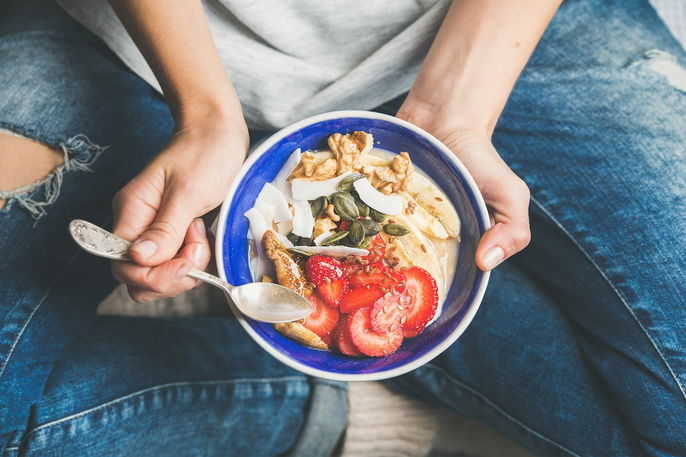A breastfeeding diet should be balanced and varied. It is important to drink plenty of water and opt for healthy foods such as fruits, whole grains, legumes and vegetables.
When breastfeeding, you are advised to avoid alcohol as well as foods that are high in fat and sugar. These tend to be low in nutrients and can harm the baby's health and development.
When breastfeeding, a mother should generally increase her diet between 200 and 500 calories to maintain optimal health and nutrition to produce breast milk. During this period it is not recommended to follow restrictive diets.

What to eat when breastfeeding
When maintaining a breastfeeding diet, foods you should opt for include:
- Fresh fruits, such as apples, strawberries, grapes, pears, watermelon, avocados, mangos, oranges, tangerines, among others.You should consume 2 to 3 servings per day, and prioritize fruits with their peel and pulp, when possible;
- Vegetables, such as lettuce, tomato, cabbage, kale, and broccoli, among others. You shoul consume 2 to 3 servings of vegetables per day;
- Proteins, such as well-cooked chicken, eggs, beef and turkey;
- Eat fish 2 to 3 times a week, prioritizing fish with a low mercury content, such as sardines, anchovies, tilapia, hake and trout;
- Whole-wheat grains, such as brown rice, whole-grain pasta and whole-grain bread;
- Legumes, such as beans, chickpeas, lentils and soybeans;
- Dairy products, such as milk, cheese and natural yogurt;
- Healthy fats, such as olive oil, avocado oil or flaxseed oil;
- Nuts, such as cashew nuts, almonds, walnuts and Brazil nuts;
- Seeds, such as flaxseed, chia, sesame and pumpkin;
- Tubers, such as potatoes, cassava, sweet potatoes, yams and yellow potatoes.
Furthermore, it is also important to drink plenty of water throughout the day. It is especially important to replace the fluids that are being used to produce breastmilk, which is approximately 700 mL per day.
Women should increase their calorie intake by 250 to 500 calories, to ensure maternal health and adequate breastmilk production.
Nutrients needed when breastfeeding
A breastfeeding diet requires a greater need for micronutrients to ensure the baby's growth and development.
The following table outlines the necessary quantities of some vitamins and minerals during breastfeeding:
Omega-3 is also very important when breastfeeding because it can promote the baby's health. You should aim to consume 1.3 g per day. Some foods that are rich in omega-3 are fish (be sure to opt for those that are low in mercury), seeds like sunflower or chia seeds and nuts like walnuts.
Also recommended: Omega-3 Foods: 14 Natural Sources, Daily Dose & Recipes tuasaude.com/en/omega-3-foodsFoods to avoid
Foods that should be avoided in a breastfeeding diet include:
- Processed foods, such as instant noodles, packaged cookies, ready-made sauces and cake mixes
- Cold cuts, like sausages, mortadella and ham
- Ready-to-eat meals, such as pizza, burgers, fast food and lasagna
- Sugar and other sweets, such as soda, boxed juices and ice cream
- Fish with a high mercury content, such as swordfish, mackerel, and tuna
- Some teas, such as ginseng, boldo, horsetail and artichoke teas
Alcohol is also not recommended when breastfeeding, as alcohol can be transferred into breast milk and be harmful to the baby.
When it is not possible to avoid drinking alcohol consumption should be occasional and in a maximum quantity of 0.5 g of alcohol per kg of body weight. For example, for a mother weighing 60 kg, alcohol intake should not exceed 60 ml of liquor or 235 ml of wine.
When alcohol is consumed, breastfeeding should be avoided for approximately 2 to 3 hours afterwards to reduce the alcohol concentration in breast milk.
Coffee when breastfeeding
Coffee contains caffeine, which is a substance that, when consumed in excess, can cause irritability and insomnia in babies. Therefore, while breastfeeding, you should consume a maximum of 200 mg of caffeine per day, which is equivalent of 340 ml of brewed coffee per day.
As newborn or premature babies may be more sensitive to caffeine, you should speak to your doctor first before drinking coffee.
Breastfeeding meal plan
The following table outlines a sample 3-day meal plan for a breastfeeding diet:
The types and amounts of food suggested on the menu vary depending on each woman's current weight, health status and nutritional needs. Therefore, it is advisable to always consult a nutritionist to carry out a complete assessment and plan an individual diet.
Diet to prevent colic
Breastfed babies that present with colic may benefit from adjustments to the mother's diet. Breastfeeding mothers should avoid foods that worsen colic, such as dairy products, chocolate, beans, peas, turnips, broccoli, cauliflower, cabbage and cucumber.
Foods that cause colic in babies may vary from one child to another, therefore you should monitor your diet when breastfeeding to determine which foods worsen colic symptoms.
When to see a pediatrician
When breastfeeding, you are advised to consult your pediatrician regularly to monitor the baby's general health, growth and development.
Babies who present with difficulty breastfeeding, irritability or excessive crying, should be assessed by a pediatrician and treated as necessary.






























